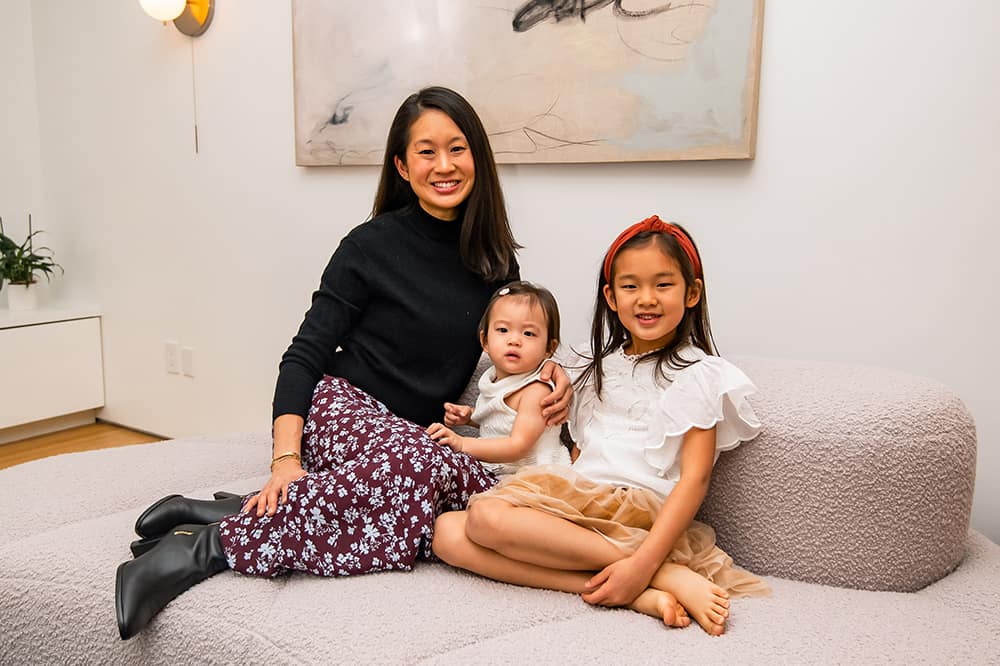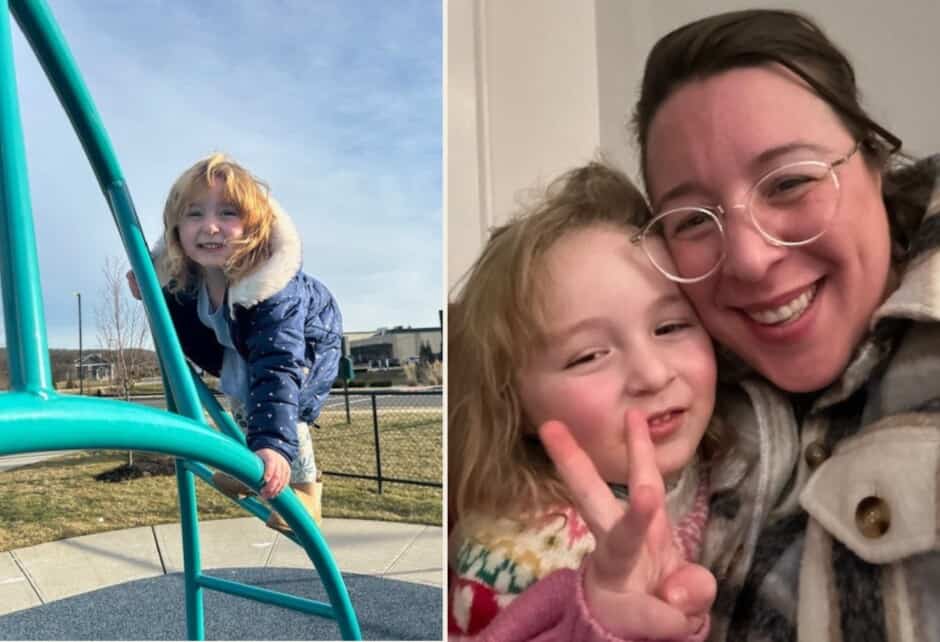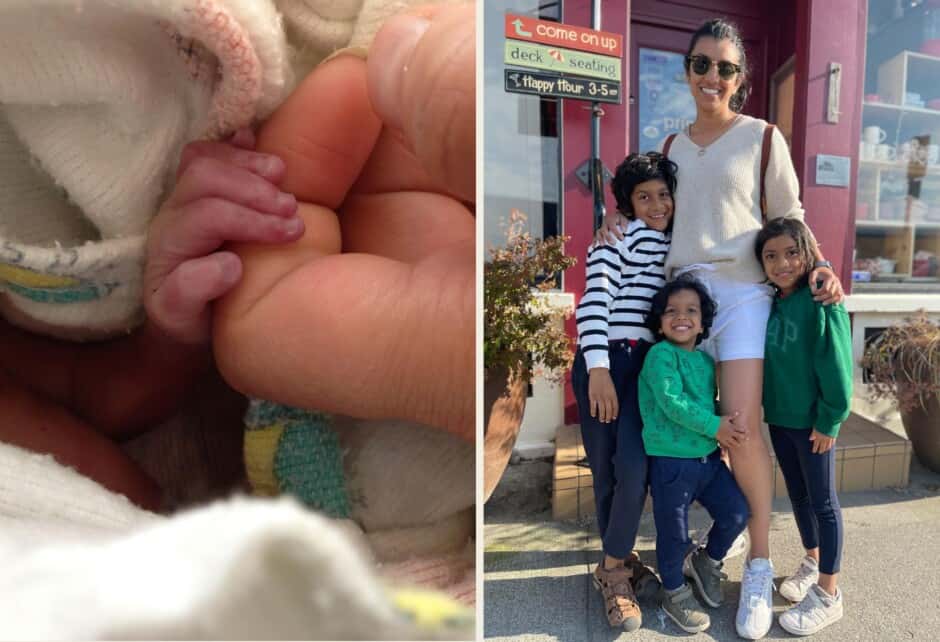
Mom Talk: Speaking Up Against Anti-Asian Hate
Written by Eunice Byun
Photography by Photo Courtesy of Eunice Byun
While today’s Mom Talk essay is painful to read, it’s also incredibly important that you do so. With a rise in violence and discrimination against the AAPI (Asian American and Pacific Islander) community in the U.S.—spurred by racist rhetoric around the coronavirus and deep-seated ignorance and xenophobia by many—a new generation is saying enough is enough. Below, mother of two Eunice Byun, the co-founder and CEO of Material, shares her personal experiences of anti Asian racism and why we all must band together to stop the microaggressions, bigotry, and hate.
It’s interesting the way your brain is wired. It protects you from certain memories—things you hadn’t thought about for quite some time. Until there is a trigger, a forcing mechanism that makes you relive those forgotten moments.
A few months back, while stay-at-home orders still loomed over the city, I was heading home with my 9-month-old daughter from her latest doctor’s appointment. Out of nowhere, a man jumped in front of us, screaming “Kung Flu!” in my face and getting too close for comfort (in pre-pandemic and pandemic times). I froze. My heart began to beat rapidly, as I swiveled the stroller away from him. I said nothing, and pushed my way ahead. When I got home, my fear turned to anger. I kept turning over in my head all the things that I wished I would’ve said. But, in reality, I had spent the past three decades of my life glossing over these types of moments, writing them off as unwell individuals (like the man on the street), drunk frat boys (yelling obscene comments in the bars), or people who never knew others outside of their towns different from them. It was excusing their racism for some reason or another—extending them the grace and humanity that, so often, they withheld from me. But the truth is that as an Asian-American, you encounter racism so casually, so back-handedly, and unfortunately now as we’re seeing with our elderly, so quietly.
The memories, unpacked.
I heard it a lot growing up. “Wow, if you didn’t look Asian, I’d think you were white.” “Where are you from again? Like, really from?” “You speak English so well!” “They’re so cheap because they’re Asian, but not like you. You’re like not that type of Asian!” Of course, there were the blatant, in-your-face moments of racism with people telling my family to “go back to where you came from!” As a young child, like so many other Asian-Americans, I was told to ignore them and hold my tongue.
But the hardest ones to endure were the ones that involved my mother. She came to the U.S. at the young age of 23, newly married, away from her own family and soon after immigrating, the mother of two young girls. Her English? Passable, with a Korean accent, but when frustrated it became broken.
I recall being 8-years-old and hearing my mom on the phone, arguing with some company over an incorrect bill. She’d try to explain what was wrong, only to meet resistance on the other side. I’d hear her repeat, “I AM speaking English!” and “No, I am not Chinese,” all while growing increasingly frustrated. The person started tearing her down: “I can’t understand you. You need to learn how to speak English if you want to live in this country.” I remember feeling a mix of embarrassment and anger. My mom waved me over, handed the phone to me, and asked me to explain what she was saying. No “defend me” or “tell them they’re wrong about me.” It was in moments like this that I somehow decided that words could be forgotten. That what was being said, although they stung, could be swallowed and pushed aside. Perhaps it was because they hurt so often that it was a method of survival.
As I got older, I held onto this belief. If I was out with friends on a Saturday night and some inebriated guy lunged at me saying he “wanted some yellow p***y tonight,” they were just words. He had a fetish. He was drunk. He didn’t touch me. If an investor I just met sat across the table from me and said, “Eunice, you need to stop being so meek and quiet (note: Asian), and be more like these female founders (note: white),” I reduced it down to his stupidity.
Why we must speak now.
Discrimination against Asians in America is not new. From The 1882 Chinese Exclusion Act to the Japanese-American internment camps and the murder of Vincent Chin in 1982. More recently, there has been a significant increase in hate crimes against Asian-Americans, including a large number of attacks on the elderly community. These attacks are violent, unwarranted, and cowardly. The rhetoric from the previous administration, with comments like “Kung Flu,” stoked the flames, but the underlying issues have been ongoing.
My experiences as an Asian-American are not unique. Many similar stories of racism against Asian-Americans have also been shared. From well-known actors like Steven Yeun to people posting on social media, our collective stories have shared experiences of pain, isolation, and hurt. And, as the mother to two young, Korean-American girls, it is sadly already a part of their narratives, asking questions like, “Why don’t I have golden hair?” or “Why does everyone at school ask if we’re cousins just because we’re both Korean?”or “No one thinks I’m beautiful because I don’t look like them.” To which I say, enough.
If we continue to experience this quietly and internally, change will never come. The system itself must change. Strong voices like that of Amanda Nguyen (@amandangocnguyen), Dion Lim (@dionlimtv), and NextShark (@nextshark) are reporting what the mainstream media is not. Follow them. Local organizations such as Heart of Dinner, Compassion in Oakland, and SafewalksNYC are protecting and serving Asian-Americans. Support them. Representation is important—in our government, on our screens, in our restaurants, and in our communities. Vote with your ballot (and with your dollars).
Naming it matters. Standing up and saying that these are racist acts, microaggressions, suppressive beliefs that are unfortunately deeply embedded in our country’s history…it matters. Words matter, which is why I am sharing mine with you now.
Are you a mother with something to say? Send us an email to be considered for our “Mom Talk” column.
Leave a Reply to Vivian Park Cancel reply
Share this story




Thank you for amplifying this story and for taking a stand on anti-Asian violence. The silence from from so many media outlets is deafening.
Even recent hate crime in Atlanta, a sheriff’s deputy Capt. Jay Baker said “was a. really bad day” for the suspect. Baker promoted sales of an anti-Asian T-shirt echoing the rhetoric of Donald Trump, referred to the coronavirus as an “imported virus from Chy-na”.
We have to really standing up and saying that these are racist acts, microaggressions, suppressive beliefs that are unfortunately deeply embedded in our country’s history.
Capt. Jay Baker is a racist also.
Racially motivated violence must stop making excuses or rebranding.
So eloquently written. It captured and conveyed the way so many Asian Americans are feeling right now. Thank you for capturing our collective sentiments and representing so many of US. You are brilliant, beautiful and bold.
Nice article, great idea for a company. Lots of girl power to you. I support your company and your humanity. Thanks for improving our culinary lives and for setting an example for your children!